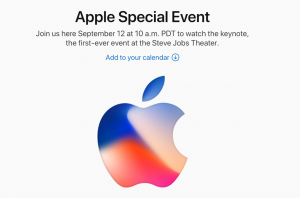
Apple logo is pictured inside the newly opened Omotesando Apple store at a shopping district in Tokyo, Japan. Source: Reuters/Yuya Shino
Advertisers’ outrage at Apple over new cookie restrictions
What are Apple’s motives behind “Intelligent Tracking Protection”?
The devil’s in the detail, especially when examining the machinations of the Internet giants that dominate our online lives.
Apple’s recent announcement event included several products, that, while not as immediately attractive as the shiny new iPhone X, will certainly affect more of us than those lucky enough to be able to spend over US$1,000 on a new phone.

Apple’s recent event contained more than just a new iPhone. Source: Apple
iOS 11, we learned, ships on Sept 19, and Mac OS High Sierra is due for release on Sept 25. Back in June (after WWDC 2017), Apple’s developer community began to discuss a new feature for Apple’s bundled web browser, Safari (the de facto choice for many users).
The feature in question is “Intelligent Tracking Protection”. The new subroutines collect statistics on resource loads and user interactions with sites, such as taps and text entry. The statistics are organized by domain (specifically TLD+1).
Apple then applies “a machine learning model” to classify which top privately controlled domains have the ability to track the user across sites.
The code allows cookies in a third-party context for 24 hours before partitioning them if the person does not revisit after that time. This means users remain known to occasional domains but those sites’ cookies are restricted and aren’t used for cross-site tracking.
After 30 days, cookies are deleted if there’s been no revisit to the original site.
These chronologically triggered cookie limitations will mirror a user’s waning interest in a product or service over time.
The machine learning process takes place locally and no user data is shared with Apple.
Galling this is presented as user protection when its just about #apple self interest. Death of a poxy browser! https://t.co/195dLQ5Wv9
— David Fergusson (@djfergusson) September 19, 2017
Apple’s reasoning for the inclusion of this feature is to enhance the user’s browsing experience, as, according to the company’s site dedicated to Webkit, “the success of the web as a platform relies on user trust.”
But the move hasn’t been welcomed by all, especially the advertising industry.
Advertising industry’s outcry
Six marketing organizations, describing themselves as organizations “devoted to innovation and growth in the consumer economy”, have written an open letter to Apple saying that the new rules could “sabotage the economic model for the Internet.” Furthermore:
“Apple’s […] heavy-handed approach is bad for consumer choice and bad for the ad-supported online content and services consumers love. Blocking cookies in this manner will drive a wedge between brands and their customers, and it will make advertising more generic and less timely and useful.”
The six trade groups are worried that Apple is effectively using proprietary code to decide who can set cookies, and how long they’ll last.
Specifically, the issue appears to concern bodies like the Interactive Advertising Bureau because smaller advertising players’ effectiveness will be diminished, and, therefore, all our experiences online will be diminished.
How do we read Apple’s move?
If the little guys are being punished, is Apple’s intention to make favorites of its Internet giant competitors (like Google, FaceBook, and Twitter)? This seems unlikely.
But can Apple really be the staunch defender of the consumer, who’s annoyed by being followed around the web by advertising material from sites that were only of passing interest?

Advertisers are protesting at Apple’s latest cookie controls. Source: Shutterstock
Consumers, of course, are rightly suspicious of the potential data harvesting carried out by companies tracking internet preferences after a site is visited, and it’s this type of activity that worries most of all.
Generally, of course, advertising on the internet isn’t popular. This article quotes that of the ten least-favorite methods of advertising, eight are online. Perhaps, however, this statistic is skewed as a greater time is today spent online, that listening to the radio or reading physical newspapers?
Effective advertising is certainly targeted and no-one should be denying advertisers the ability to sell to select audiences. In fact, those audiences are usually happy to receive and act on, well-placed, well-timed & executed ads.
Good advertisers are aware that the web isn’t necessarily the future – that may be in social channels or tech yet to emerge.
Come up with new — humane — business models, ad-farmers, or die whining. You will not be missed.https://t.co/dMuNuxW0uI
— Vasilis (@vasilis) September 17, 2017
It’s the practice of reckless data harvesters using the same web cookie tech that has queered the pitch for all advertisers.
The advertising industry would do well to remember what the Internet was created for, and why (clue: it wasn’t to sell stuff).
Commercialism is merely piggy-backing onto an interconnected network of data sharing. Tenants don’t get to make the rules and cry foul if things aren’t ideal for their ends.
READ MORE
- Strategies for Democratizing GenAI
- The criticality of endpoint management in cybersecurity and operations
- Ethical AI: The renewed importance of safeguarding data and customer privacy in Generative AI applications
- How Japan balances AI-driven opportunities with cybersecurity needs
- Deploying SASE: Benchmarking your approach
